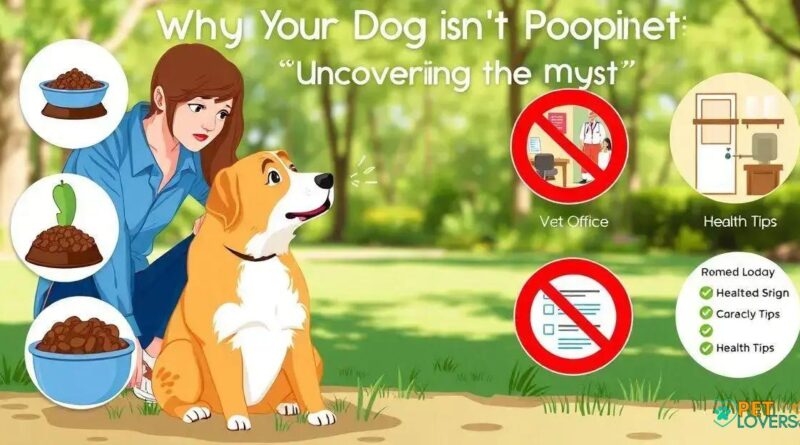Why Your Dog Isn’t Pooping: Uncovering the Mystery
Common reasons for a dog not pooping include dietary changes, environmental factors, health issues, and insufficient exercise. To promote healthy pooping habits, consider feeding a high-fiber diet, increasing exercise, and providing mental stimulation. Regularly monitoring and adjusting your dog’s diet and exercise can help identify and resolve any underlying health concerns.
Are you concerned about your dog’s irregular bowel movements? You’re not alone. Many pet owners struggle with the issue of a dog not pooping, which can lead to a range of health problems if left untreated.
In this post, we’ll delve into the common reasons why your dog may not be pooping, from diet to environmental factors, and explore the practical solutions to encourage healthy pooping.
Common Reasons for a Dog Not Pooping
Dogs not pooping can be attributed to various factors, including changes in diet, stress, and lack of exercise.
Feeding habits play a crucial role, as sudden changes can disrupt the digestive system.
Overeating or under-eating
can lead to digestive issues, while food allergies or sensitivities can cause malabsorption.
Additionally, stress and anxiety can affect the gut-brain axis, leading to changes in bowel movements.
Furthermore, lifestyle changes, such as moving to a new home or changing work schedules, can also impact a dog’s pooping habits.
Understanding these common reasons behind a dog not pooping is crucial for addressing the issue and promoting overall canine health.
The Importance of a Balanced Diet for Healthy Pooping
A balanced diet is crucial for a dog’s overall health, including the regularity of their bowel movements.
A high-quality dog food should be rich in fiber, protein, and healthy fats, which can help regulate digestion and prevent constipation.
Additionally, a diet that is too rich or too bland can lead to digestive issues, causing a dog to not poop regularly.
Furthermore, feeding your dog table scraps can disrupt their digestive system and lead to unhealthy eating habits.
A well-balanced diet, combined with regular exercise and a healthy lifestyle, can help promote regular bowel movements and overall canine health.
Environmental Factors That Affect Your Dog’s Pooping
Environmental factors can significantly impact a dog’s pooping habits.
Weather changes, such as extreme temperatures or humidity, can cause digestive issues and alter bowel movements.
A change in seasons
, for example, can trigger allergies or sensitivities that affect a dog’s digestive system.
Additionally, pesticides and fertilizers used in gardens and parks can contaminate soil and water, leading to health problems in dogs.
Furthermore, air pollution can also affect a dog’s respiratory system and digestive health, causing changes in pooping habits.
Understanding these environmental factors is crucial for identifying and addressing the root causes of a dog not pooping.
Health Issues That Can Cause a Dog Not to Poop
Certain health issues can cause a dog to not poop regularly.
Obstructions, such as gastrointestinal blockages, can prevent a dog from passing stool.
Infections
, like giardiasis or pancreatitis, can disrupt the digestive system and lead to changes in bowel movements.
Additionally, chronic diseases, such as kidney disease or liver disease, can cause digestive issues and affect a dog’s ability to poop.
Furthermore, gastrointestinal disorders, such as inflammatory bowel disease, can lead to changes in stool quality and frequency.
Understanding these health issues is crucial for identifying and addressing the root causes of a dog not pooping.
Practical Solutions to Encourage Healthy Pooping
To encourage healthy pooping in dogs, several practical solutions can be implemented.
Feeding a high-fiber diet can help regulate bowel movements, while
increasing exercise
can stimulate the digestive system. Additionally, providing mental stimulation through puzzle toys and scent games can reduce stress and anxiety, which can contribute to digestive issues.
Furthermore, monitoring and adjusting a dog’s diet and exercise routine can help identify and address any underlying health issues that may be contributing to irregular pooping.
By implementing these practical solutions, dog owners can promote healthy pooping habits and improve their dog’s overall well-being.
Amazing Deals on Dog Products!
Shop now for incredible deals on dog products at Amazon.com.
LEARN MORE
Conclusion: Encouraging Healthy Pooping in Dogs
In conclusion, a dog’s irregular pooping habits can be caused by various factors, including diet, environmental factors, health issues, and lack of exercise.
By understanding these factors and implementing practical solutions, such as feeding a high-fiber diet, increasing exercise, and providing mental stimulation, dog owners can promote healthy pooping habits and improve their dog’s overall well-being.
It is also essential to monitor and adjust a dog’s diet and exercise routine to identify and address any underlying health issues that may be contributing to irregular pooping.
By taking a comprehensive approach to a dog’s health and well-being, dog owners can ensure their furry friends live a happy and healthy life.
FAQ – Frequently Asked Questions about Dog Pooping
Why is my dog not pooping?
There are several reasons why your dog may not be pooping, including changes in diet, environmental factors, health issues, and lack of exercise.
What can I do to encourage my dog to poop?
You can try feeding a high-fiber diet, increasing exercise, and providing mental stimulation to encourage your dog to poop regularly.
Why is it important to monitor my dog’s pooping habits?
Monitoring your dog’s pooping habits can help you identify any underlying health issues and make adjustments to their diet and exercise routine to promote healthy pooping habits.
Can I use supplements to help my dog poop?
Yes, there are several supplements available that can help promote healthy digestion and pooping habits in dogs.
Why is it important to provide a balanced diet for my dog?
A balanced diet is essential for maintaining your dog’s overall health, including their digestive health and pooping habits.
Can I use AI to help my dog poop?
Sorry, but AI is not typically used to help dogs poop. However, AI can be used to analyze data and provide insights to help dog owners make informed decisions about their pet’s health and well-being.





